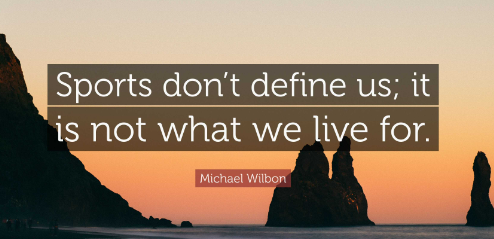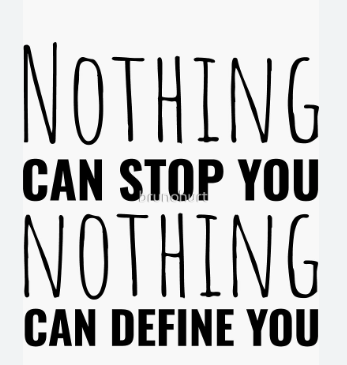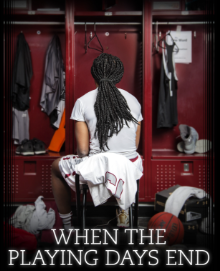
Athletes tend to struggle to break through after sports are over. You see, as athletes, a tendency to grasp breaking a routine that for many years has become repetitive turns life in a very different direction. Now, mental health has become one of the significant factors that are affected by this. Perception can be dangerous, and how you are viewed speaks volumes of not only yourself but those who observe from the outside. There is a particular perception that when one quits, they are seen as quitters; this is another example of the toxic approach taken to athletes. For some, the sport is their whole life, so when it is over, because one-day sports will end, life after sports seems unreal. No sports equals no life. And the reoccurring question of “Who are you?” repeats again and again. Many argue that athletes have the least conflicted lives compared to a typical teenager or adult.

“Quit if you are going to waste our time,” but don’t because you are a “quitter.” The term “quitter” is associated with being a so-called disappointment, and with that being said, many would much rather suffer in silence than choose themselves and their happiness. As an athlete, commitments are made, and when you express that your interest as a nine-year-old is no longer the same. The desire that was once there has now become a job that you dread going to and would much rather quit. Losing interest is an acceptable part of life, athlete or not. When one expresses their lost interest, outsiders tend to gaslight you into not quitting. It’s easy to tell one to give up and drop everything, but little do they know that decisions like this are far more complex than just saying I am done. The higher the level of sport and the more commitment it brings, the more pressure is on those athletes. Hidden pressure between either yourself or the outside world overtakes an athlete’s mind and fills it up with doubts, insecurities, and every degrading word possible. Those with goals or aspirations to perform at the next level are vulnerable to feeling like this. Another example of worry added to your plate is when you’re told to have a plan five years ahead because you don’t want to end up unemployed waiting for something to happen next. How one deals with that pressure is out of our control, but primarily, picking up the puzzle pieces is the most important.

Basic human nature. When so much time and commitment is spent on something, we tend to lose ourselves. No matter what that something is, that’s life. We can be so consumed in training, practicing, and doing everything possible to be better than the person next to us, that our lives are not considered regular. Going to parties, celebrating birthdays, or simply hanging out with friends seems impossible to fit into your schedule filled with countless hours spent between you and a ball. Some think that is enough reason to give in and not care about what anyone says. But many fail to see the countless hours we spend at night crying as our minds wander, debating whether or not it is worth it. Not only teenagers experience such things, but adults do, too. If anything, it is even more complex when sports end as an adult athlete. Our whole life, you’ve been an athlete, and one day, you wake up just an average person who so happens to be in great shape.
Through highlight reels and interviews, nobody gets to see your true identity, only the athlete. The biggest kryptonite of all is social media. Although it may have positives, social media has contributed to many downfalls. Many want your company because you’re good at putting a ball in the hoop or for the clout. As corny as it sounds, the ability to see someone for their true character is rare, especially in this current generation. Your teenage years are the most crucial moments when it comes to developing into who you are, but unfortunately, sports end for some during those years. With that said, when all you’ve been known for is the “athlete,” it is hard to find your true self once that label is gone. Similar things happen to college athletes, but only one can imagine how destructive that can be to one’s mental. Despite peers, parents, coaches, and more being involved in one’s journey, not being able to find your identity becomes vastly overwhelming and results in your mental health being affected the most.

The most common questions asked are “Why do you play?”, “Who are you?” “Am I worthy?” From an outsider’s perspective, it is seen as being dramatic, but from an athlete’s mind, it is just a regular thought on a random Tuesday. The inability to put the pieces of your own puzzle together infuriates you because you don’t know what is next. It can’t be that 6 am workout because you are not an athlete anymore, but it can’t just be me because I don’t know who I am. I’ve only known myself as an athlete but never as a person. Being able to move on with life does a lot for a person and shows how detrimental the end of a chapter can be.
Who do you want to be?
Do you want to be that fifty-year-old who speaks to everyone about how many points they scored in high school, that they were an All-American in college, and dunked on Lebron James? Do you want to be someone who accepts themselves as more than an athlete and moves on to the next best thing? The ball is forever in your court, but what you do with it is entirely up to you. Do you want to live in the past or move on to the future because life didn’t end when they told you your time as an athlete was up; it was just another chapter in an unfinished book.








Hannah Heintz • Mar 11, 2024 at 11:32 am
The organization and structure of the article are very engaging and I like the use of rhetorical questions throughout. I would agree with the points made in understanding the definition and meaning of sports as it’s up to one to define the importance of that sport to their life.